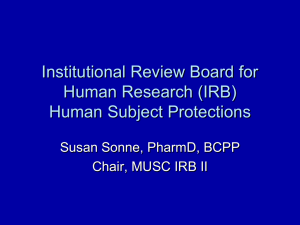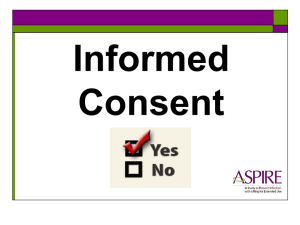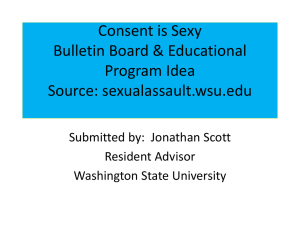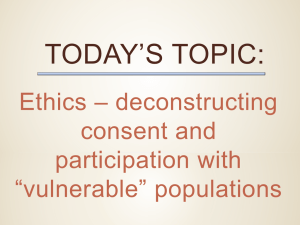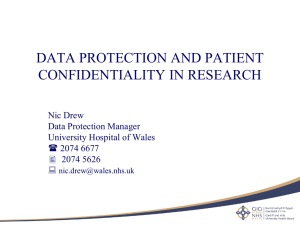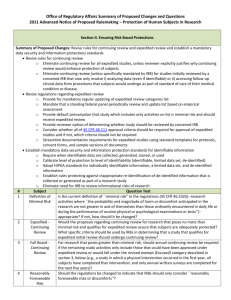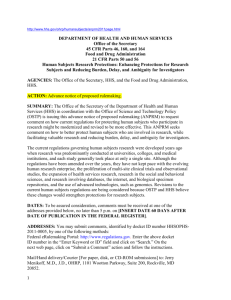Proposed changes to the common rule
advertisement
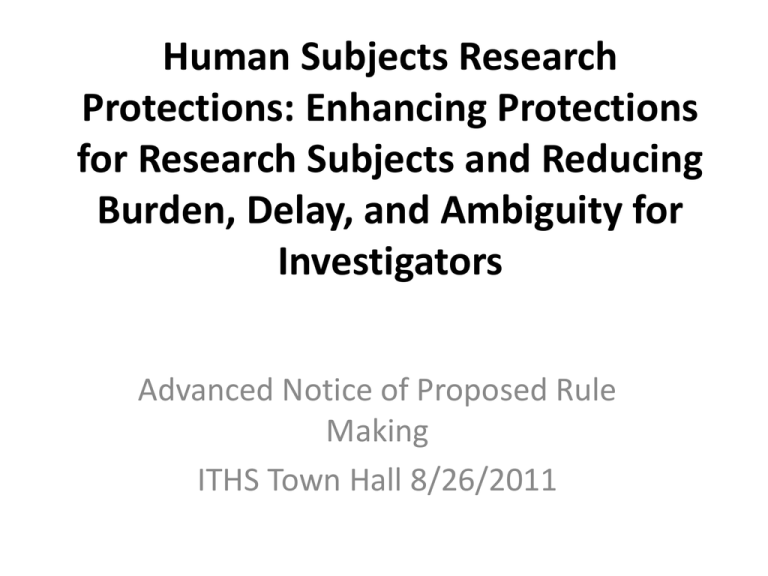
Human Subjects Research Protections: Enhancing Protections for Research Subjects and Reducing Burden, Delay, and Ambiguity for Investigators Advanced Notice of Proposed Rule Making ITHS Town Hall 8/26/2011 Agenda • Brief overview of the ANRPM – Process for modification to the Common Rule – Proposal • Details of proposals affecting the consent for and use of biospecimens – Intent and implications of proposed changes • Discussion Process Advanced Notice of Proposed Rulemaking Public comment period - closed Sept 26, 2011 Notice of Proposed Rulemaking Rule Why • 45CFR46 Subpart A – the “Common Rule” was adopted 20 years ago • Recognition that research has changed significantly since that time – Increase in volume – More multicenter trials – New informational risks due to use of genetic information • Concern that current process requires a lot of time and resources without the attendant protection of subjects for which the rules were intended Human Subjects Research Protections: Enhancing Protections for Research Subjects and Reducing Burden, Delay, and Ambiguity for Investigators • Proposing agencies: Office of the Secretary, HHS and the FDA – http://www.hhs.gov/ohrp/humansubjects/anprm 2011page.html • Each proposed change is presented followed by a set of questions – There are 74 questions to direct the feedback being requested. Structure of the ANPRM • Section I – Background –why and why now • Sections II –VIII – Details of the proposed changes • Section IX – Request for information and comment – How to submit comments Summary of Proposed changes 1. Refinement of the existing risk-based regulatory framework (Section II); 2. Utilization of a single IRB review of record for domestic sites of multisite studies (Section III); 3. Improvement of consent forms and the consent process (Section IV); 4. Establishment of mandatory data security and information protection standards for all studies that involve identifiable or potentially identifiable data (Section V); 5. Establishment of an improved, more systematic approach for the collection and analysis of data on unanticipated problems and adverse events (Section VI); 6. Extension of Federal regulatory protections to all research, regardless of funding source, conducted at institutions in the U.S. that receive some Federal funding from a Common Rule agency for research with human subjects (Section VII); and 7. Improvement in the harmonization of regulations and related agency guidance (Section VIII). Section II – ensuring risk-based protections • Set mandatory standards for data security and information protection based on HIPAA – IRBs would not then be responsible for assessing adequacy of protection of informational risks • Default to expedited continuing review even if original application required full board review when remaining activities are minimal risk • Updating list of what qualifies for expedited initial review and eliminating continuing review for these studies. Section II • Converting “exempt” category to “excused” category – Would be subject to the new data security and information protection standards – Expand category – Clarify the definition of “existing” to mean collected for purposes other than the research and not that the data and specimens have to exist when the study starts – Written consent would be required for use of existing biospecimens Section II • New excused category – Written consent would be required for use of preexisting data if collected for research purposes • if collected for non-research purposes, consent only if identifiable – Require registration of excused research, not review of application – Add a tracking and audit requirement of excused research Section III – streamlining IRB review of multi-site research • Mandating that all multi-site domestic trials rely on a single-site IRB – Would not apply to international research – Would not apply to FDA regulated device trials Section IV – improving informed consent • Changes to the consent forms – Specifying required content – Restricting inappropriate content – Limiting length – Reducing institutional “boilerplate” language – Providing standardized consent form templates Section IV • Changes to informed consent process – Clarification of the waiver criteria – Allowing more oral consent – Requiring consent for use of pre-existing biospecimens regardless of identifiability Section V – strengthening data protections • Aligning Common Rule and HIPAA standards for de-identified data • Classifying all biospecimens as identifiable and requiring consent for use • Enhancing data security standards • Data can still be considered de-identified if investigators see the identifiers but don’t record them • Require periodic random audits for enforcement Section VI – data collection to enhance oversight • Standardize data elements for reporting • Implementing a web-based Federal-wide portal for safety reporting • Harmonize safety reporting guidance across all federal agencies Section VII – extension of Federal Regulations • Extend common rule protections to all research conducted at institutions that receive any federal funding for research and VIII – clarifying and harmonizing agency guidance • Reconciling the advantage of consistency across Federal departments and agencies providing guidance with need for flexibility and timeliness of issuance of guidance. Summary of proposed changes Improving effectiveness Enhancing protections Distinction between types of risk – note informational risk Federal oversight expanded Eliminating some required continuing review Central database for adverse events Improved applicatio n of expedited review Informed consent improvements for research posing minimal risk Single IRB review of multisite studies Written consent for use of biospecimens Harmonization of guidance Confidentiality protections Emanuel and Menikoff: 10.1056/NEJMsb1106942 published July 25, 2011 at NEJM.org - taken from PRIM&R webinar – Pearl O’Rourke Ways to comment • www.regulations.gov - HHS-OPHS-2011-0005 • Mail/Courier to: Jerry Menikoff, M.D., J.D., OHRP, 1101 Wootton Parkway, Suite 200, Rockville, MD 20852 • UW HSD discussion board https://catalyst.uw.edu/gopost/board/sherrye /22982/ • E-mail Karen Moe by 9/10 at kemoe@uw.edu • Send comments to the ITHS discussion board https://catalyst.uw.edu/gopost/board/lalithas /23060/ Future ITHS Town Hall Discussions • September 2 – Seattle Children’s Hospital – Wright Auditorium 9-10:30am – changes to minimal risk and exempt research (excused); proposed changes to informed consent – Moderator - Doug Diekema, MD, MPH, Prof. Pediatric Bioethics, Chair, Children's IRB • September 9 – FHCRC, Thomas Building D1-084 – data security requirements and information protection standards; central IRB review for multi-site studies – Moderator - TBD

